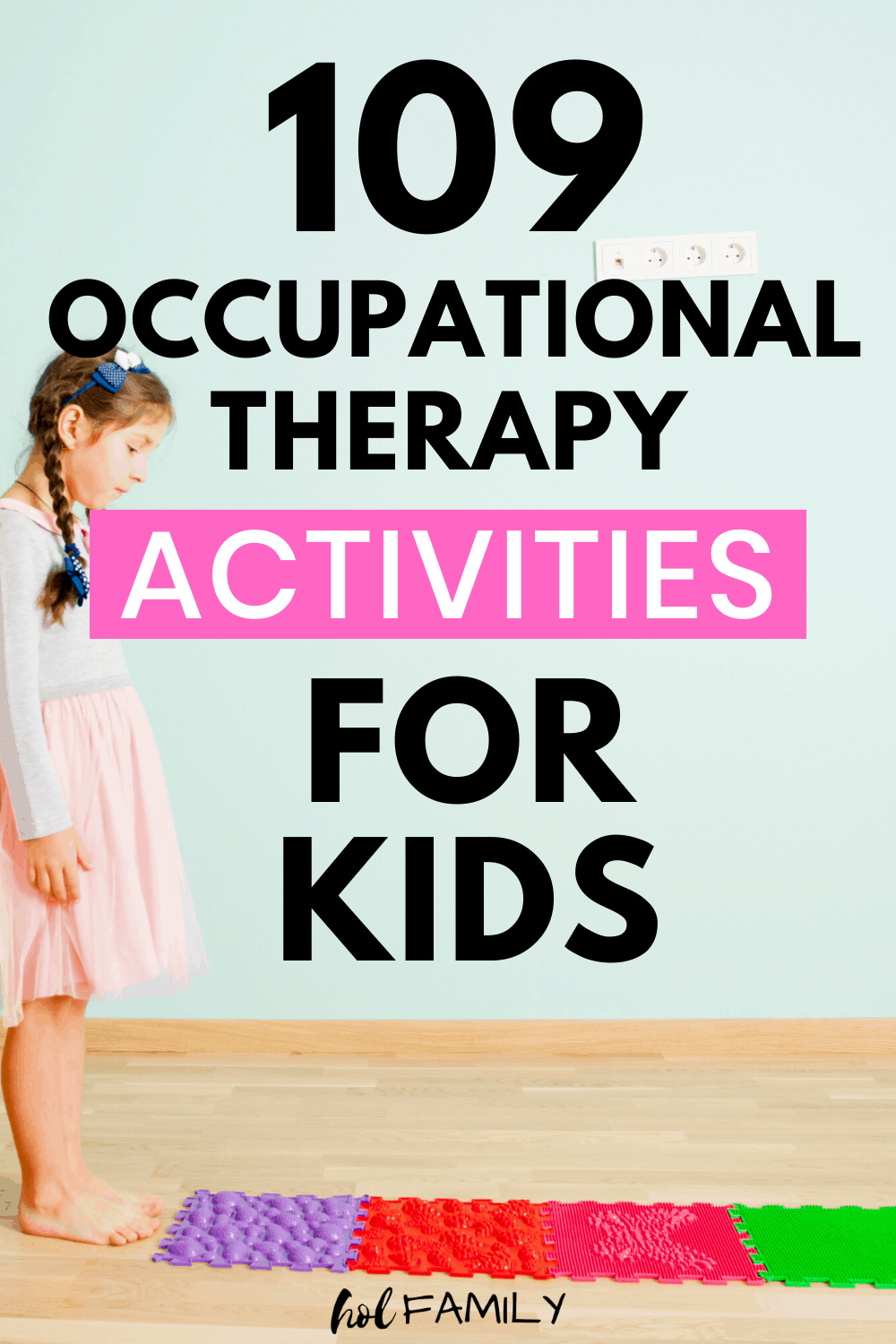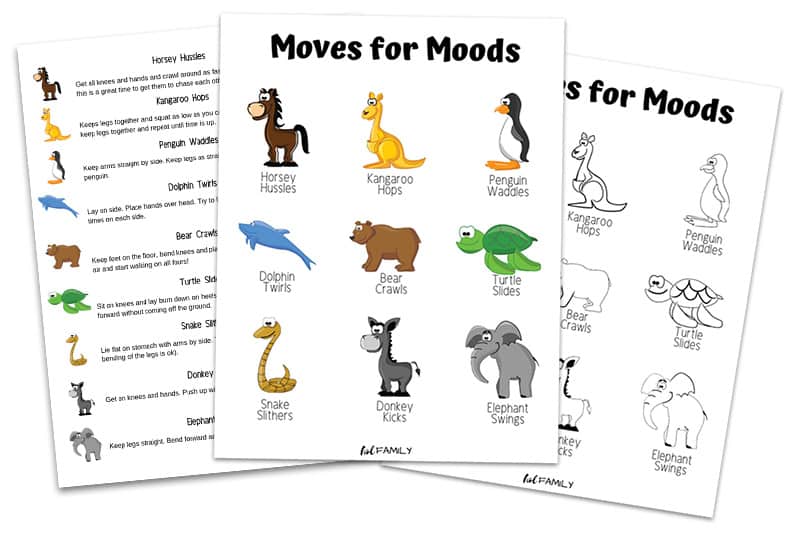
When we learned that the country would be shutting down thanks to Coronavirus COVID-19 pandemic, my first thought wasn’t “do I have enough toilet paper” or even “how am I going to manage homeschooling and a full-time job at home.” Nope. My first thought was “how am I going to keep my little man on track without all of his therapy appointments?”
Maybe you can relate? If you’re stuck at home in quarantine and can’t get your child out to their regular therapy sessions, don’t panic! There’s enough of that going on. Parents are having to take on new responsibilities learning how to work from home with kids, act as substitute teachers, and for some of us — become a substitute therapist.
No, we can never be quite as magical as our kid’s therapists seem to be, but that doesn’t mean we can’t try! My son has high-functioning Autism and sensory processing issues and was making so much progress with his occupational therapist. So, I decided to round up some of the best occupational therapy activities we could do at home!
Please keep in mind that I am not an occupational therapist, and these activities are only my suggestions to keep your kiddo working on occupational skills at home when in-person therapy isn’t an option.
Because no two kids are alike, there are different needs and goals when it comes to therapy. I’ve grouped the activities by skill area to make it easier to pick out options based on your individual child’s needs.
Fine Motor Skills
Fine motor skill activities are aimed at developing and strengthening the small muscles of the hands and wrists.

Strength Activities
- Play with clothespins and practice opening/shutting using alternate fingers, pinning around a piece of paper, pinning up toys, etc.
- Practice cutting patterns using kid-safe scissors
- Play with playdough, putty, clay, modeling foam, etc.
- Knead bread or cookie dough then roll with a rolling pin
- Practice squeezing a spray bottle or water gun using different fingers
- Practice punching holes using a hole puncher
- Pop bubbles from a bubble pack
- Use tweezers to pick up and sort small objects like beads or puffballs
- Squeeze a stress ball
- Fill one bowl with water and leave one empty, then have your child practice soaking a sponge and wringing out the water into the other bowl
Finger Isolation Activities
- Practice using index finger to draw in sand, shaving cream, a steamy window
- Play with finger puppets
- Practice hand motions for songs like “Baby Shark”
- Play finger soccer and thumb war
- Finger paint
- Play with a toy cash register, calculator, toy phone, etc.
- Play with toy musical instruments that require fingers (clarinet, recorder, piano, etc.)
- Practice buttoning and snapping
- Practice tying shoes
- Play with stickers
In-Hand Manipulation

- Crumple a piece of paper using one hand
- Pick up multiple objects using one hand then put them down one at a time
- Pick up a coin and “hide” it using one hand then show it again
- Remove a pen cap while hilding the pen with one hand
- Hold a bunch of coins in one hand and use that same hand to deposit them into a piggy bank one at a time
- Open and close a lid using one hand
- Turn a doorknob using one hand
- Play with legos
Pincer Grasp
- Stick and peel stickers
- Play “Pick up sticks“
- Sort tiny objects like beads
- Practice peeling fruit like oranges and bananas
- Practice sealing and opening Ziplock bags
- Practice moving objects with tweezers
- Practice transferring water from one cup to another using a medicine dropper
- Play lacing games
Hand Arches

- Make a cup with one hand and practice shaking dice
- Pretend the hand is a spider and make it walk
- Practice cutting playdough with a plastic knife
- Practice touching each finger to the thumb, one at a time
- Play the game “Operation“
- Play crawling games (pretend to be animals, play crawling tag, play crab tag, etc.)
- Make a massage train
Thumb Opposition and Opening Webspace
- Practice shuffling cards
- Play with eye droppers (make this fun by using food dye in water and mixing colors)
- Squeeze round balls like stress balls or other sensory balls
- Wash the car with a sponge
- Practice cupping hands around the mouth to shout
- Play “Connect Four,” “Jenga” or “Lite Brite“
- Practice buttons and snaps
Eye-Hand Coordination
(Also known as Visual Motor Integration)

- Use popsicle sticks to make different shapes
- Practice throwing and catching a ball
- Tracing with a highlighter
- Practice drawing shapes of various sizes using chalk
- Play with bouncing balls
- Blow bubbles
- Play with lacing cards
- Make necklaces using patterns with beads
- Play “Simon Says” to practice left side and right side awareness
Upper Body Strength/Stability
- Use a runner bike (also known as a balance bike)
- Try bouncing and balancing on a balance or Bosu ball
- Make an obstacle course that involves climbing, kneeling, crawling, etc.
- Lay on the tummy to play with toys, watch television, read, or color
- Do these silly animal moves
- “Climb” a toy ladder laid flat on the floor
- Play with a hula hoop
- Play on a jungle gym
Crossing the Midline
Check out an entire post on crossing the midline here!
- Crawling (for kids who skipped crawling or never learned to crawl properly, this is especially important)
- Touching the right hand to the left foot and then switching sides
- Swimming
- Martial arts (kicking and punching across the body)
- Playing Twister
- Yoga (try Cosmic Kids)
- Dancing (GoNoodle or You Tube are great)
- Ribbons and streamers (make circles and patterns)
- Hop scotch
- Move like animals (crawl like a crab, bear walk, hop like a bunny, stand like a flamingo)
- Draw figure eights on the ground (using chalk) or on a chalkboard (practicing on vertical surfaces adds another dimension)
- Practice with zippers, buttons, shoelaces, snaps
Bilateral Coordination

- Throw and catch a ball using both hands at the same time
- Ride a bike
- Squeeze a sponge between two hands
- Play with toy brooms (both hands on the broom)
- March like a soldier
- Jump rope
- Play with toy drums
- Roll a rolling pin (playdough or cookie dough)
- Play with legos or blocks
Self-Help Skills
- Practice tying shoes
- Practice buttons
- Practice zippers
- Practice putting on socks
- Practice using utensils
- Practice putting on a coat
- Practice washing hands
- Practice getting dressed
- Practice brushing teeth and hair
Sensory Processing
Check out these posts on sensory processing issues in kids and creating a sensory diet.
Alerting activities:
- Jump on a trampoline
- Dance to fast music
- Eat something cold, mildly spicy, or sour
- Push a heavy object across a room
- Run laps
- Do jumping jacks
- Make an obstacle course
- Play outside
- Ride a bike
Calming activities:
- Make a calming corner with a calm down kit
- Hug a weighted teddy bear
- Dim the lights and turn off all loud noises (noise-canceling headphones work too)
- Do a kids meditation or yoga
- Lay under a weighted blanket
- Swing or rock in a rocking chair
- Use calming aromatherapy
- Blow bubbles or a pinwheel (encourages deep breathing)
Some Final Thoughts
If you can’t get out to occupational therapy appointments or are just looking for some ideas to incorporate at home, these activities can be very beneficial. These activities aren’t meant to replace the therapy that your child may be getting at school or in the community, just to supplement during times like quarantine or when appointments are missed.
The best part about these activities is that they are fun! If you have other kids at home, they’ll probably want to join in too — and that’s perfectly okay!
What types of occupational therapy activities are you doing at home? Leave a comment below and let me know!












